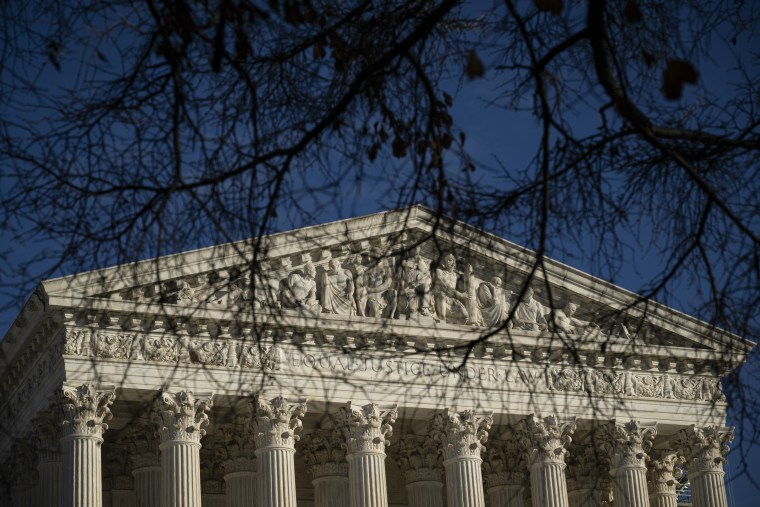WASHINGTON — The Supreme Court early Saturday told the Trump administration not to take any action to deport Venezuelan men based in Texas it alleges are gang members.
The court did not grant or deny an application filed by lawyers for the detainees, but effectively hit pause on the case, which affects people currently held within the jurisdiction of the Northern District of Texas.
“The government is directed not to remove any member of the putative class of detainees from the United States until further order of this court,” the brief order said.

Two conservative justices, Clarence Thomas and Samuel Alito, disagreed with the Supreme Court decision, the order noted.
At around the same time, the New Orleans-based 5th U.S. Circuit Court of Appeals rejected a request by the men, who the administration alleges are gang members, to halt any deportations under a wartime law called the Alien Enemies Act.
On Friday afternoon, at least one charter bus rolled up to the Bluebonnet Detention Center in Anson, Texas, a town about 200 miles west of Dallas, where the men are being held.
Administration officials are seeking to deport the men, who they say are members of the Tren de Aragua gang. There are major questions about whether the government has the authority to apply the Alien Enemies Act to gang members outside of a war situation and whether adjudications about gang membership are accurate.
The plaintiffs “ask only that this court preserve the status quo so that proposed class members will not be sent to a notorious prison in El Salvador before the American judicial system can afford them due process,” their lawyers at the American Civil Liberties Union wrote in the Supreme Court filing.
In a statement, Lee Gelernt, the lead ACLU attorney in the case, praised the Supreme Court's decision, saying, “These men were in imminent danger of spending their lives in a horrific foreign prison without ever having had a chance to go to court. We are relieved that the Supreme Court has not permitted the administration to whisk them away the way others were just last month.”
The Supreme Court action follows an April 7 decision in which the court made it clear that any people the government wants to deport under the Alien Enemies Act need to be given the chance to challenge the decision via habeas corpus petitions.
Later on Saturday, Solicitor General D. John Sauer filed theadministration's response at the court as directed, urging the justices to reject the plaintiffs' application once they have had a closer look at the case.
Among other things, he said the request was filed prematurely before lower courts could properly weigh in.
“Under these highly irregular circumstances, applicants can hardly establish a clear and indisputable entitlement to the extraordinary relief they seek,” he wrote.
Sauer also said that any detainees subject to imminent deportation have “adequate time to file habeas claims” and that the government has agreed that it will not deport anyone with a pending claim.
White House press secretary Karoline Leavitt commented on the case Saturday, saying she expects that the administration will be allowed to carry out its deportation plans.
"We are confident we will ultimately prevail against the onslaught of meritless litigation brought by radical activists," Leavitt said in part of a post on X.
The case raises questions not just about Trump’s aggressive and unprecedented use of presidential power in invoking the 18th-century law, which has been used only when the country was at war, but also about whether his administration is complying with court orders.
In its earlier decision, the Supreme Court faulted a judge in Washington for the way he handled the case but said plaintiffs could sue in the districts in which they are confined. The vote to overturn the lower court was 5-4, with liberal justices joined in part by conservative Justice Amy Coney Barrett.
Litigation continues in a separate case over the Trump administration’s mistaken deportation of Kilmar Abrego Garcia to El Salvador.
